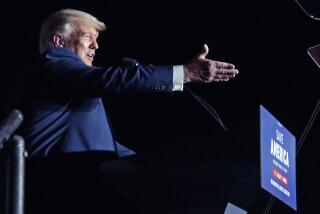Ex-CEO can’t get fair shake, defense argues
Can a former chief executive -- especially one who made $232 million running a home-building company in the three years before the industry melted down -- get a fair shake from jurors on charges of defrauding investors?
Attorneys for former KB Home CEO Bruce Karatz told a Los Angeles federal judge Monday that bias against corporate bosses runs deep, and took the extraordinary step of hiring a polling firm to prove its point.
The Hart Research Associates poll showed that top executives are even more disliked than politicians.
Asked what they would think if the government charged a CEO with fraud and concealing transactions to increase his compensation -- the charges against Karatz -- more than two-thirds of prospective jurors said they would consider the defendant either definitely or probably guilty.
“The vast majority of potential jurors see corporate CEOs as greedy and willing to break the law,” the polling firm said in its report.
Karatz’s lead defense lawyer, John Keker of San Francisco, described the public mood as brimming with “an extreme amount of prejudice and payback-ism.”
Karatz, 64, was charged in March with 20 federal counts of fraud and making misleading statements. He is accused of manipulating stock option grants for himself and others at KB Home for a more favorable price and then hiding those changes from the company’s board, shareholders and regulators. He has pleaded not guilty and denied wrongdoing.
U.S. District Judge Otis Wright brushed aside the opinion survey, which he said was conducted in an “inherently biased” way. “I gave it no weight whatsoever,” Wright said.
He added, however, that Keker was “100% correct” that the typical person on the street would probably be prejudiced against a CEO accused of fraud. Wright said he would therefore grant defense requests for special screening of the jury pool, including lengthy questionnaires and having some prospective jurors answer questions out of the presence of other prospects.
“We do not want the entire pool contaminated by certain statements,” Wright said as he began to shape the way in which Karatz’s trial will play out next year.
Wright rejected a defense request for eight additional peremptory challenges -- the right to bump potential jurors without explaining why -- in addition to the 10 that are normally granted to the defense.
He also refused to bar prosecutors from introducing evidence on eight topics that Keker described as “every smearing, innuendo-filled bit of nonsense they can come up with.”
The topics included Karatz’s divorce settlement, his allegedly autocratic management style and his deletion of e-mails having to do with stock options. Another topic is his attempts “to manage the press coverage” about his compensation, which, as The Times reported in 2006, had far outstripped the pay for CEOs at rival home-building companies.
Karatz, scheduled for trial in February, resigned from KB Home after an internal inquiry found he had backdated his stock option grants to increase his pay. Last year, he agreed to pay more than $7 million to settle a Securities and Exchange Commission civil case but didn’t admit wrongdoing.
Hart Research interviewed 1,001 people from Los Angeles, Ventura, Santa Barbara and San Luis Obispo counties who would qualify to serve on a federal jury in Los Angeles.
The poll presumably would have produced similar results anywhere in the United States, given the country’s “deep and abiding suspicion of those in high financial positions,” said Loyola Law School professor Laurie Levenson.
“The timing stinks if you’re a corporate defendant,” said Levenson, a former federal prosecutor, “because the odds are that nearly everybody has been affected negatively by the economic downturn.”
Defense attorneys will need to “personalize the defendant” to keep the government from making Karatz a scapegoat for the economic meltdown, she said. But it will be a challenge.
“When the defendant has a long list of zeros at the end of his salary and you don’t, it’s hard to set aside your feelings.”
--
More to Read
Inside the business of entertainment
The Wide Shot brings you news, analysis and insights on everything from streaming wars to production — and what it all means for the future.
You may occasionally receive promotional content from the Los Angeles Times.











